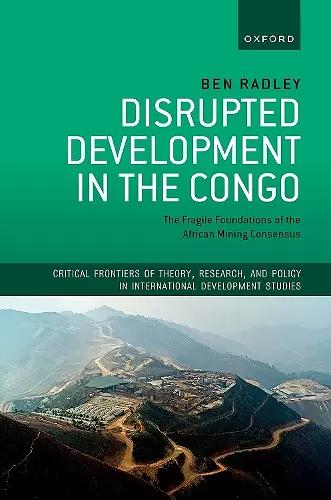Disrupted Development in the Congo
The Fragile Foundations of the African Mining Consensus
Format:Hardback
Publisher:Oxford University Press
Published:16th Nov '23
£76.00
Supplier delay - available to order, but may take longer than usual.

Since the turn of the century, low-income African countries have undergone a process of mining industrialization led by transnational corporations. The process has been sustained by an African Mining Consensus uniting international financial institutions, African governments, development agencies, and various strands of the academic literature. The Consensus position is that mining industrialization can drive transformative processes of social and economic development in low-income African settings. For this, state-owned enterprises and local forms of labour-intensive mining are deemed unsuitable. The former is characterized as corrupt and mismanaged, and the latter as an inefficient, subsistence activity with links to conflict financing. The Consensus holds, instead, that mining industrialization should be led by the superior expertise and efficiency of transnational corporations. Disrupted Development in the Congo reveals the fragile foundations on which this Consensus rests. Through an in-depth case study of mining in the Democratic Republic of the Congo, Ben Radley details how foreign corporations have been prone to mismanagement, inefficiencies, and rent-seeking, and implicated in fuelling conflict and violence. He also documents how structural impediments to the transformative effects of mining industrialization in low-income African countries occur irrespective of ownership and management structures. Based on the findings presented, Radley urges a move away from the market-led logics underpinning the Consensus. In the mining sector itself, he argues that efforts to mechanize labour-intensive forms of local mining better meet the needs of low-income African economies for rising productivity, labour absorption, and the domestic retention of the value generated by productive activity than the currently dominant but disruptive foreign corporate-led model. Part of this title is published open access. This part is made available under a Creative Commons Attribution-Non Commercial-No Derivatives 4.0 International licence. It is available to read and download as a PDF on the Oxford Academic platform.
This book is a major contribution to scholarship on economic development in low-income countries by its brilliant analysis of theories of development from Raul Prebisch and the CEPAL structuralists in Latin America to Samir Amin and his followers in Africa. It ought to be read by all those interested in economic development in mineral-rich countries in Africa and in other countries of the South. * Georges Nzongola-Ntalaja, Professor of African and Global Studies, University of North Carolina *
The analysis in this book should inspire policy makers in African countries who hope to chart a new course towards resource-based industrialization that is transformative, inclusive, and sustainable. * Léonce Ndikumana, Distinguished Professor of Economics, University of Massachusetts *
In this hard-headed and systematic critique, Radley reveals how domestic forces in and around mining create more favourable opportunities for developing national sovereign projects in Africa. A must read for anyone looking for radical policy alternatives. * Ray Bush, Professor Emeritus, African Studies and Development Politics, University of Leeds *
Disrupted Development in the Congo is a meticulous, essential and dystopian study tracing how one such foreign-led enterprise - now defunct Banro Corp. - established an ambitious project to industrially source gold from two major mining areas in eastern DRC (Twangiza in South Kivu province and Namoya in Maniema province). * Christoph N. Vogel, The Journal of Development Studies *
This book is an essential resource for policymakers, development economists, scholars, and students interested in the dynamics of mining-based economies and their broader socio-economic implications. It also serves as an invaluable reference for NGOs and international bodies involved in formulating and implementing development policies in Africa. The insights provided are crucial for anyone committed to fostering sustainable development in resource-rich, low-income countries, making it a cornerstone text for understanding and improving economic development frameworks in similar contexts. * Christian S. Otchia, The Journal of Peasant Studies *
Disrupted Development in the Congo is a harrowing tale of how positivist theory and corporate practice go hand in hand not only in devastating indigenous development in the periphery, but also in creating - as Polanyi (1944) remarked and the case of Banro corroborates - an ultimately self-destructive machine. * Christoph N. Vogel, The Journal of Development Studies *
ISBN: 9780192849052
Dimensions: 240mm x 160mm x 17mm
Weight: 472g
224 pages